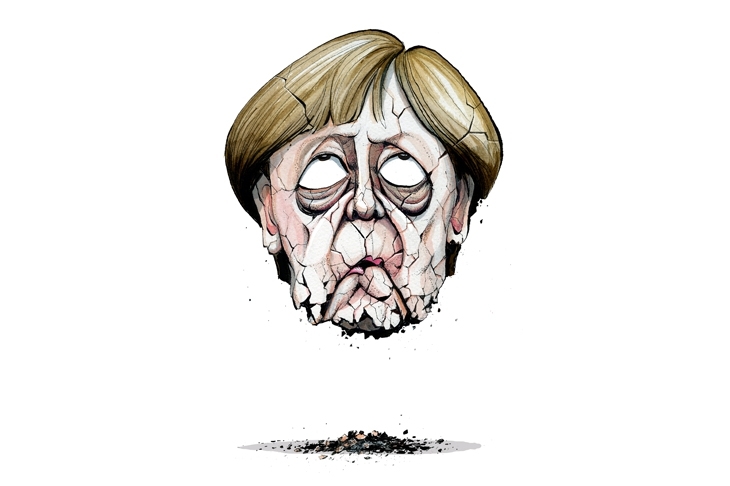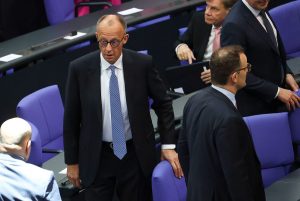On Sunday, Angela Merkel’s Christian Democratic Union of Germany (CDU) suffered a historic election defeat in their former heartlands of Baden-Württemberg and Rhineland-Palatinate. ‘The state elections struck deep at the heart of the union of the CDU and CSU,’ said Markus Söder, leader of the CDU’s Bavarian sister party, the Christian Social Union.
To an increasingly frustrated public, the ruling parties in the capital look tired and devoid of ideas. There is no incentive for Merkel and her cabinet to turn things around. After 16 years in government and on the brink of retirement, she has become a lame-duck chancellor. Some German journalists have even begun to call the whole sorry saga ‘the duck tales’.
Instead of addressing vaccine problems that are costing lives and livelihoods, the government is pointing the finger — at each other, at the US, at AstraZeneca. While the EU Commission brags that it is the ‘number one supplier of COVID-19 vaccines to the world’, clinically vulnerable Germans are struggling to get vaccinated as the country struggles to ramp up the rollout. And at the center of it all, Angela Merkel’s CDU brushes these concerns aside with complacency, offering nothing more than platitudes about ‘extraordinary circumstances’ and ‘teething problems’ that have caused more and more German voters to look for alternatives.
Dubbed the Superwahljahr (super election year), 2021 looks increasingly as if it could usher in a dramatic change in German politics. Sunday’s elections were the first of six state-level polls. There will be further local elections before the main event of the German federal elections in September.
It was, therefore, all the more shocking that the CDU suffered its worst-ever results in the southern states on Sunday. While Markus Söder’s opening statement the following morning appeared confident, he was visibly determined to impress on the government in Berlin that ‘we cannot leave people under the impression that the Union (CDU-CSU) has run out of ideas after 16 years in power.’ Over and over again, he evoked concepts of change, rejuvenation and vigor.
When questioned directly by a journalist about what he made of the election result, the Bavarian leader was quiet for a long moment, his hands silently searching the air for the right phrase. When he found it, it wasn’t exactly elegant but the message was to the point: ‘That’s it… This was a wake-up call, this really was a wake-up call, this thing yesterday. This is a wake-up call. We can’t just continue like this for six, seven months.’ While clumsy, Söder’s mix of Bavarian German and the English phrase ‘wake-up call’ betrayed his instinctive concern that if the ruling parties continue with their sluggish complacency, there may well be a rude awakening in September.
Traditionally, the Catholic southern states of Germany have been a conservative bastion in national and local elections. Having been taken for granted for too long, they have begun to vote more diversely, with the Green party benefitting the most. While this trend has long been underway and the respective Green and Social Democratic minister presidents of both states were merely reconfirmed, most pollsters were predicting a far better outcome for the CDU than they eventually achieved. In Baden-Württemberg, the CDU was leading in surveys in January with 32 percent, ahead of the Greens on 30 percent. The outcome on Sunday produced a shock result of 24 percent for the CDU and 33 percent for the Greens.
Standing in front of the Bavarian-blue banners of his party and wearing his usual face-mask with his state’s emblem on it, Söder visually and verbally emphasized the importance of the southern German states in the upcoming federal elections in September. Traditionally safe center-right territory, the two contested states — together with Söder’s own Bavaria — account for around a third of the German population. The CSU leader is right to worry about the implications of an erosion of confidence there.
The new CDU leader and Merkel’s potential successor, Armin Laschet, responded to the collapse in party support by pointing the finger at the CDU’s coalition partner in Berlin, the Social Democratic party (SPD). But Söder failed to stick to the script; his statement was a litany of specific policy complaints. Hit by corruption scandals in the procurement of face masks as well as the botched vaccination rollout, the government in Berlin is rapidly hemorrhaging all the popularity that had bloated the polls during the seemingly successful handling of the pandemic up until January.
But could Söder be the man of the hour? Could he turn things around for the CDU and CSU? Their candidate for the German chancellorship will only be decided sometime after Easter. The question of who will replace Merkel is so popular that it now has a snappy short form, ‘K-Frage’ (a contraction of Kanzlerkandidatenfrage or ‘chancellor candidate question’). Söder only ever answers the ‘K-Frage’ question with evasion and a wry smile.
On the one hand, the Bavarian leader’s list of pandemic complaints is the most honest and direct of any senior politician. He has openly criticized the suspension of the rollout of the AstraZeneca vaccine by European countries and even advocated for German politicians to lead the way by using this vaccine themselves to restore trust in it. He called for a restructuring of the power structures in Berlin in a bid to shake loose the growing sense of complacency in the capital. His approval ratings remain high, while a recent survey revealed that 73 percent of Germans did not think Laschet’s continuity candidacy would be suitable.
Söder is clearly onto something. As a CSU candidate, he can credibly claim to have remained outside the mess in Berlin. As a South German, he might also inspire renewed trust from CDU voters in those regions. Notably, turnout during the state elections on Sunday dropped by 7 percent, many of those who defected turned to the Green party. So it stands to reason that there are a fair few disgruntled and politically homeless conservative voters who might be persuaded to return to the fold with the right policies and the right politician.
But does Söder want to be chancellor under such challenging circumstances? Whoever inherits the chancellorship from Merkel will have to rebuild a 16-year-old structure that is as creaky at the hinges as it is solidified at the core. He or she will have to deal with COVID, unresolved questions around immigration, increasing structural problems in Europe and international tensions. Picturesque Munich must seem like a splendid redoubt from which to watch the battles of others. Whether Söder can bring himself to leave the relative safety of Bavaria and step into the political mess that is Berlin may well swing the pendulum in Germany’s ‘super election year’.
This article was originally published on The Spectator’s UK website.

























